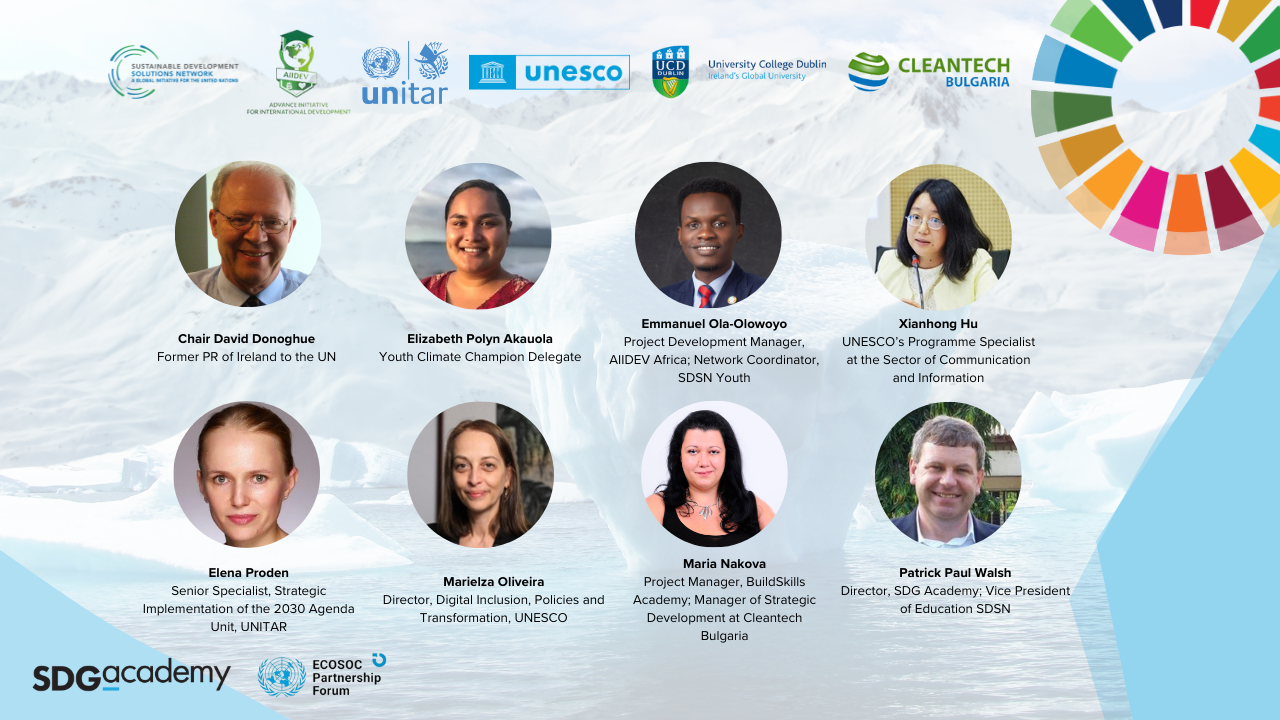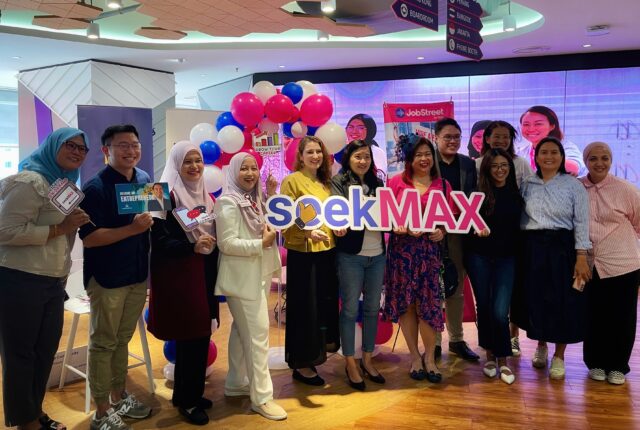By Jessica Christ
On January 30, 2024, the SDG Academy of SDSN hosted an official side event to the UN Partnership Forum. The event was entitled “Building Resilience in Youth Vulnerable to Economic, Social and Environmental Shocks.” The chair for the event was David Donoghue, Former Ambassador of Ireland to the UN and long-time supporter of the SDG Academy, and the speakers included Patrick Paul Walsh of University College Dublin and the SDG Academy, Elena Proden of UNITAR, Elizabeth Polyn Akauola who was a COP28 International Youth Climate Delegate, Maria Nakova of CLEANTECH and BuildSkills Academy, Emmanuel Ola-Olowoyo of AIIDEV Africa and SDSN Youth, and Marielza Oliveira and Xianhong Hu of UNESCO.
The goal of the event was to discuss the emerging trends pertaining to the involvement and attainment rates of youth in upper secondary education, tertiary education, and vocational training, as well as their progression into gainful employment. As the growing problem of youth non-engagement continues to garner global attention, the speakers emphasized the importance of implementing policies and making investments that focus on fostering equity and inclusivity in both educational and vocational training spheres to bolster the resilience of young people susceptible to economic, social, and environmental shocks. The discussion highlighted policies and practices designed to encourage well-informed and effective educational decision-making across various levels and included examining the role of vocational education and professional training in facilitating transitions towards employment opportunities.
The intergenerational panel of speakers presented a comprehensive discussion on numerous interconnected issues related to youth education, engagement, and employment, underscoring the significance of policy measures, intersectoral partnerships, and strategic investments to tackle these challenges. In addressing youth inclusion and resilience the panel also envisioned collaborative endeavors of educators and practitioners across governmental, corporate, and civil society sectors, equipping them with pertinent educational content and training to actively participate in the labor force to advance sustainable development.
The key issues discussed were adapting education for an evolving workforce, enhancing youth resilience, youth as catalysts for inclusive societies and sustainable development, youth disengagement, vocational training, and informed decision making in education.
Key Takeaways
Adapting education for an evolving workforce
The speakers addressed the ongoing educational transformations needed to meet the dynamic demands of a changing labor force in the age of digital and sustainability transformations.
Specifically, shifting away from traditional degree programs toward microcredentials and professional training certifications could provide a solution for upskilling workers for a sustainable workforce. Maria Nakova highlighted the importance of upskilling through her presentation of the Build Skills Academy in Europe. The Build Skills Academy is an initiative to identify and address transitional skills, specifically green and digital skills, to support resilience in the workforce. By focusing on short-term, accessible, and focused training programs, educational credentials can be better tailored to the needs of the evolving workforce.
Enhancing youth resilience
The need to prioritize the resilience of vulnerable youth through targeted policies and investments, and address economic, social, and environmental shocks was imperative to the panel.
Elena Proden highlighted the need for education to not only focus on achieving labor market goals, but also to include aspects of socio-emotional learning and development. Proden mentioned various initiatives, such as awareness campaigns, project-based learning, youth engagement, and participatory research, to enhance youth capabilities and resilience. Fostering youth resilience and socio-emotional well being is essential with the global shocks of recent years. Audience members concurred that a lack of proper orientation and skills was a barrier to entry in the labor market and expressed a desire for proper orientation and mentorship, with critical thinking and exposure to job markets.
Youth as catalysts for inclusive societies and sustainable development
The panel highlighted the importance of recognizing the pivotal role of young people as catalysts in crisis response, recovery, and preparation for future shocks, contributing to inclusive and resilient societies and advancing sustainable development.
Elizabeth Polyn Akauola was the key youth voice on the panel and demonstrated the importance of youth in creating a sustainable future. In discussing her involvement at COP28, she shared how important it is for young people to be involved in climate negotiations. She emphasized the importance of youth involvement in climate action beyond awareness-raising, advocating for technical training and expertise. However, this training is only possible with the creation of youth programs and financial support opportunities.
Youth disengagement
The speakers discussed how to best tackle the widespread problem of youth disengagement globally and underscored the importance of fostering equity and inclusivity in both educational and vocational training realms.
David Donoghue stated that the global shocks of the past few years, such as the COVID-19 pandemic and the escalation of global conflicts, have interrupted the normal education and training structures for many young people. These young people are now drifting and disengaged from the labor market. As highlighted by multiple speakers, many youth are now falling into the category of “non-activity” in that they do not work nor are they enrolled in education. Patrick Paul Walsh stressed the necessity of upskilling and reskilling young people to meet the demands of digital transformation and sustainable development. He provided examples of educational pathways, such as a master’s program in sustainable development, aimed at helping professionals and young people acquire skills for sustainability and digital competency.
Vocational training
Speakers acknowledged the crucial role of vocational education and professional training in facilitating smooth transitions from education to gainful employment in jobs of the future, highlighting the significance of these pathways.
Emmanuel Ola-Olowoyo highlighted the importance of practical skills development and aligning education with industry needs to enhance employability. Ola-Olowoyo emphasizes the significance of vocational education in reducing unemployment and contributing to economic growth. Specific vocational training can help youth meet the needs of the rapidly changing workforce.
Informed decision making in education
Finally, the panel discussed promoting well-informed decision-making in education across various levels, encompassing policies and practices that guide youth in making informed choices.
Marielza Oliveira highlighted the issue of digital exclusion, noting that despite global connectivity, millions remain offline due to affordability and accessibility challenges. Oliveira discussed UNESCO’s Information for All Program (IFAP), which focuses on developing information ecosystems and capacities at scale, particularly for marginalized groups like women and youth. Xianhong Hu also discussed the importance of creating policies and practices to integrate youth in education. Specifically, Hu emphasized the importance of including young people in policy discussions on AI-related issues, highlighting their role in combating misinformation. Audience members agreed that an inconsistent and changing political climate made it difficult for youth to obtain opportunities and make informed choices about education and work. UN organizations, private and public stakeholders, and governments need to create inclusive policies that support youth in a rapidly changing education environment.
Where do we go from here? Key Recommendations
Both panelists and members of the audience shared various recommendations on how to better build resilience in youth. First, enhancing youth capabilities in digital ecosystems would address the need for diverse actions, including bridging digital inequalities and providing ongoing opportunities for skill enhancement, to empower young individuals for effective participation in evolving digital landscapes. Second, vocational education and professional training opportunities can facilitate smooth transitions from education to gainful employment in jobs of the future. Audience members agreed that learning critical and relevant skills would better prepare young people for the job market. Third, as discussed by multiple panelists, leveraging microcredentials as a powerful catalyst to facilitate the transition towards a sustainable and inclusive future, and recognizing the imperative significance of investing in pathways to improve education-to-employment transition is key to building resilience in youth. Fourth, crafting and executing policies with a focus on equity and inclusivity in education and vocational training and ensuring universal accessibility to opportunities regardless of socio-economic backgrounds is a must. Audience members echoed this need when mentioning the lack of financial and technological resources available to some populations. Finally, stronger public-private partnerships can support youth in their transition from education to the workforce. Fostering collaborations among educational institutions, government entities, and private sector organizations to synergize efforts can ensure that education aligns with market demands and offer tangible training opportunities.
Overall, the panelists discussed the urgent need to rethink youth in education and the labor market. With the various global shocks that occurred over the past few years, young people find themselves at a disadvantage. Many youth are in the “non-activity” category in that they do not work or study. Audience members and panelists agreed that education models need to be redesigned to accommodate the changing world. Specialized vocational training programs, microcredentials and short-term certifications, and digital literacy programs are just some of the ways that youth can begin to build new and transferable skills. Organizations, such as those who hosted the panel, must work together to reimagine sustainable education programs that are relevant to today’s labor market.
The recording of the side event can be found here:

Jessica Crist
Jessica Crist is an Education Manager with the SDG Academy. Jessica received her Bachelor’s degree in International Affairs and Spanish Language and her Masters degree in International Education from the George Washington University. Jessica is interested in global migration crises and recently completed a study of refugee access to education in the Washington, DC area. The culmination of this research was published in an edited volume in Fall 2023. She is passionate about SDG 4 and the incorporation of sustainable development in education.



